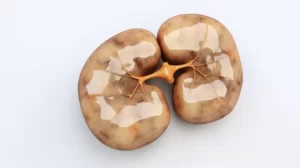Having to deal with kidney stones can be excruciatingly painful, which is why it’s crucial to take preventative measures. Several studies have shown that simple lifestyle changes can considerably lower your risk of developing kidney stones. In this article, we’ll discuss the causes of kidney stones and provide practical tips to avoid the pain associated with this medical condition.
Obesity, Diabetes, and Kidney Stones
Obesity and diabetes are shown to be strongly linked to the development of kidney stones. According to researchers at the University of Washington School of Medicine, people who are significantly overweight, or have diabetes, heart disease, or metabolic syndrome, are more likely to suffer from kidney stones.
Kidney stone cases have slowly been increasing, particularly among women. As a result, kidney stones have become a serious public health issue. To prevent kidney stones, it’s crucial to address these underlying causes first and foremost.
How Simple Exercise Can Help
A study performed by the Women’s Health Initiative encompassing over 84,000 postmenopausal women found that even small amounts of exercise could reduce the risk of kidney stones by about one-third. The intensity of the exercise doesn’t seem to matter, as explained by researcher Matthew Sorensen. This implies that low-intensity exercises can also be helpful.
To get the most significant benefit from exercise, women can try walking for approximately three hours per week (at a pace of 2-3 mph) or engage in four hours of light gardening. Alternatively, one hour of moderate jogging (6 mph) can also help protect you against kidney stone development.
Watching Your Caloric Intake
Another essential factor in kidney stone prevention is being mindful of your calorie intake. The Women’s Health Initiative study noticed that consuming more than 2,200 calories per day could increase the risk of suffering kidney stones by over 40 percent. Additionally, obesity already puts you at a higher risk of developing these painful stones.
Sorensen states that it’s important to be aware of your calorie intake, watch your weight, and exercise to maintain good health and avoid kidney stones.
Other Dietary Tips for Kidney Stone Prevention
Although keeping an eye on your calorie consumption is vital, there are other dietary factors that can help prevent kidney stones. The National Kidney Foundation suggests several dietary tips to avoid kidney stones, including:
- Stay hydrated – Drinking plenty of water can help dilute the substances that might otherwise lead to stone formation. Aim for at least 8-10 glasses of water per day.
- Reduce salt consumption – High sodium levels can increase the accumulation of calcium in your urine, raising the probability of developing a stone. Stay away from packaged or highly processed foods that typically contain high amounts of sodium.
- Limit your animal protein intake – Consuming too much animal protein can cause a spike in urinary calcium and oxalate levels. Instead, opt for more plant-based proteins.
- Consume calcium-rich foods – Including calcium-rich foods in your daily diet, such as low-fat dairy products, helps prevent kidney stones. Surprisingly, low calcium levels increase the risk of stone formation as the body increases the absorption of oxalate.
Importance of Early Detection and Treatment
It’s essential to detect kidney stone symptoms early on to avoid complications. Common signs of kidney stones include severe back or abdominal pain, blood in the urine, nausea, vomiting, and fever or chills. If you experience any of these symptoms, consult your doctor promptly to discuss treatment options.
In conclusion, making lifestyle adjustments such as monitoring your calorie intake, exercising regularly, and following dietary tips can significantly reduce your risk of kidney stones. Stay proactive in maintaining your overall health, and take the necessary steps to steer clear of kidney stone pain.



